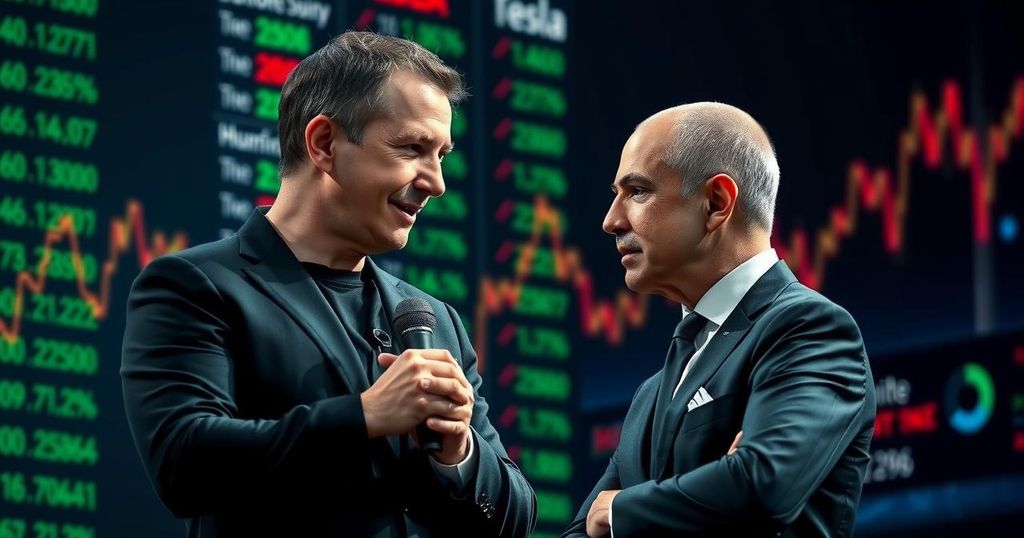Musk vs. Bezos: A Renewed Feud Over Tesla Stock Amid Political Shifts
Elon Musk has claimed that Jeff Bezos advised people to sell their Tesla stock, anticipating that Donald Trump would lose the election, a claim Bezos promptly denied. Musk’s political engagement has significantly impacted Tesla’s stock following Trump’s victory, highlighting their ongoing rivalry within the context of the presidential election. Historical tensions between Musk and Bezos have been exacerbated by competition in the space exploration sector, indicating a complex relationship between their businesses and political affiliations.
Recent tension has escalated between Elon Musk and Jeff Bezos, as Musk asserted that Bezos advised his acquaintances to divest from Tesla stock in anticipation of a loss by Donald Trump in the presidential election. Musk disclosed this information during a post on X, mentioning that he learned it at Mar-a-Lago. Jeff Bezos promptly refuted this claim, stating it was “100% not true.” Musk’s response—whether sincere or sarcastic—underscored their ongoing rivalry.
The significance of the election ramifications for Musk’s ventures, particularly Tesla, cannot be overstated. He has heavily invested in Trump’s campaign, resulting in institutional recognition and an apparent alliance with the incoming president. This political endorsement bore fruit for Musk, as Tesla’s stock surged over 40% following Trump’s election.
Contrastingly, Bezos has remained politically neutral, refusing to endorse either candidate during the election cycle, and he defended this stance by suggesting that endorsements do not significantly influence electoral outcomes. His position emerged amidst his company’s competitive efforts against Musk’s SpaceX within the space sector, highlighting their shared business environment rife with competition.
Historically, Musk and Bezos have had a contentious relationship, stemming from their involvement in the space exploration industry. Amazon’s Project Kuiper omitted SpaceX from its launch provider list, prompting allegations that personal rivalry dictated such business decisions. Musk has previously mocked Bezos for his legal pursuits against SpaceX, indicating the profound depth of their conflict.
This rivalry, which has escalated over the years, now intertwines in the context of significant political and economic developments affecting both their businesses. The evolving dynamics between their respective companies and their political affiliations will be critical to observe in the coming years as they compete not only in business but also for influence and support within governmental structures.
This article explores the ongoing rivalry between Elon Musk and Jeff Bezos, including a recent incident where Musk accused Bezos of advising individuals to sell their Tesla shares due to his belief that Trump would lose in the election. The article delves into the implications of this rivalry, particularly in the context of the recent presidential election, where both businessmen engage in political and economic strategies that impact their corporate interests.
In conclusion, the rivalry between Elon Musk and Jeff Bezos serves as a striking reflection of the intersection of business and politics. Musk’s assertion regarding Bezos’s alleged advice on Tesla stock divestment highlights the personal tensions between these titans of industry, particularly in light of the recent election. The notable rise in Tesla’s stock following Trump’s electoral victory underlines how deeply intertwined political alliances can influence corporate valuations. Meanwhile, Bezos’s avoidance of endorsements starkly contrasts with Musk’s overt political engagement, showing varied strategies in navigating their respective business landscapes. The trajectory of this rivalry will be crucial to watch as both leaders continue to shape their industries amid a changing political climate.
Original Source: fortune.com




Post Comment